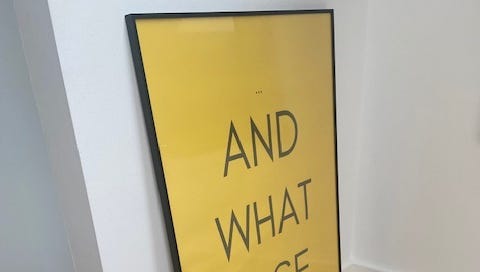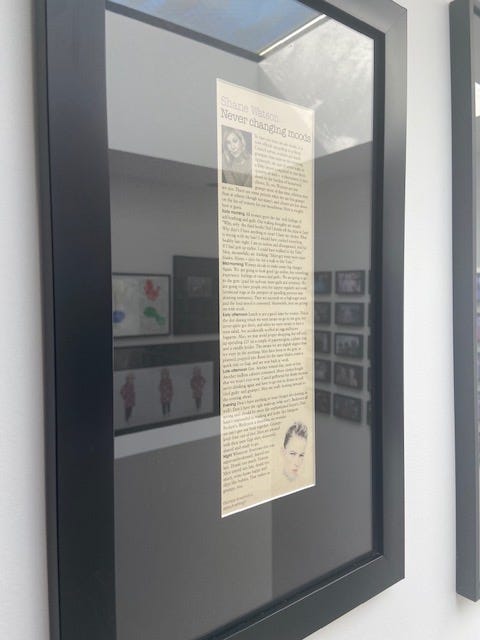Can I Talk About My Identity Crisis?
Key moments in my life have thrown me into an identity crisis. I have also aspired towards socially-constructed identities that I just didn't fit into...
I was lying on the sofa when Ella appeared with a bit of paper and said those dreaded words, “Mummy, can you help me with my homework?”. “What is it?” I muttered, hoping it was Maths or Science or Geography or Technology or any of the functional stuff her father is much more equipped to deal with. “I need to write a poem about having an identity crisis”. “Oh,” I thought, snapping to attention and rising into a vertical position - “this one’s got my name all over it”.
I’ve always wanted to produce inspirational poetry, something short, snappy yet empowering that gets pinned on Pinterest, printed on coasters, read out at funerals so I dug deep and channelled my inner poet.
“What about this?” I said…
A Woman’s Identity Crisis
I had one at 11, at 18 and 33.
It happened with the milestones and every year between.
Now I’m in my forties, it’s brought me to my knees.
They’ve given me a label, a role I’m meant to own.
I’m a mother, I’m a daughter, a midlife messy sandwich but in my head I’m more.
I’m trapped in what the world wants, I rarely feel like me. I’m somewhere in a system that never lets me be.
Ella screwed up her face. “It’s not about you Mum, it’s about the girl in the book we’re reading in English”.
Last week, I read a summary of a coaching session with Jackie from Norwich. Jackie was asking, “is there more to life or is this it then?”. She had sadness in her eyes1. At forty-two, she’d already completed the usual ‘checklist of life’ - qualifications, marriage, kids, job. She was healthy, privileged, financially secure. She should feel grateful but she felt unfulfilled, stifled because she saw her days as more of the same - house, work, school, dog walks, shopping, giant-trampoline-in-the-garden, bifold doors, new car, holiday. She was ticking all the right boxes but it wasn’t enough.
It made me curious. I asked my husband if he had ever had an identity crisis. He had no idea what I was talking about. He had never considered his sense of self nor queried his purpose on the planet. He hadn’t struggled with any inner conflict. He enjoys his work, likes to play a bit of golf, have a beer, walk the dog around the golf course, practice his golf swing, bemoan his golf score, chat to his four-ball, watch golf. He has no internal voices. He is completely self-affirming. He is surprisingly content despite living with me. I conducted an experiment whilst out for dinner. I suggested he lead the conversation. It was dire. There were awkward silences. He asked me what plans I had for the next day. Usually, I chatter endlessly about my latest existential drama, the enlightenment I’m searching for and he patiently listens.
I remembered the cutting I had kept from a magazine, now framed in my downstairs toilet. It described how women are much grumpier than men in the mornings. They greet the day with feelings of self-loathing and guilt, over-analysing how they failed to hit the mark yesterday and anticipating all the things they’ll not quite achieve today. It was a humorous take on the complexity of the woman’s brain versus the simplicity of the man’s. “Mid-morning,” it said, “Women decide to make some big changes. AGAIN”.
Is it a woman thing, I wondered, always over-analysing and aspiring towards some mythical better version of ourselves2? Since I started a career break and started unpicking what matters to me, my values and beliefs, I’ve had so many conversations with other women about how they have lost their identity, are trying to find their identity, don’t know whether they even have an identity, think there is a true identity that eludes them, wonder what first step they could take to locate this missing identity. There are common threads running through most of their stories – parental expectations, gender constructs, societal conditioning, cultural oppression.
There are certainly key moments in our lives which throw us into identity chaos. But even though they rock our foundations and limit our choices, we don’t really talk about them nor receive the support to evolve successfully through them. Most of my identity crises have coincided with major developmental transitions in my life, often involving the addition or removal of a few hormones – adolescence, then matresence3, now peri-menopause. Puberty arrives so early for girls. “Does this make me a woman now?” I naively asked my mother. I was only eleven years old. It was the end of childhood but she just showed me where to access the necessary supplies and I got on with it. It’s the same for my daughters. I grieve their enforced maturity.
‘Becoming a mother’ was the transition that most messed with my head. I had no idea what I was meant to do, nothing had prepared me for that overnight switch from independence to dependence, for the mental, physical, emotional and spiritual upheaval I would go through, for the monumental shift in how I saw myself, career success replaced with domestic failure. Lifted out of everything secure and familiar, my axis tilted then flipped, the expectations, the judgment overwhelmed me. It was all about the baby, there were no charts to congratulate me. Now I have emerged from the relentless juggle of trying to maintain a professional identity alongside a personal identity I never really understood, I am sandwiched in midlife, potentially caring for both my children and my parents at the same time, my dad’s hospital appointments scheduled in around school pick-ups.
As I unpick my journey to date, I can identify three socially-constructed identities I have aspired towards. None have suited me yet I have battled repeatedly with them, measuring my performance against their standards – the ‘good girl’ (well-behaved, perfectionist, people-pleaser, conforming, appeasing, considerate), the ‘good mother’ (well-behaved children, patient, loving, available, organised, selfless) and the ‘successful woman’ (good mother + great career, achiever, high profile, has-it-all, wears the right clothes and isn’t too old). For a long time, my identity has been completely mixed up with public roles I thought I had to perform to a particular standard to guarantee success. However, as Jackie has realised, you can arrive at a point in life and realise where you have ended up, isn’t where you want to finish, the ‘success’ is an empty shell. Jackie’s coach encouraged her to take stock of her current situation, to look past the outward appearances and define where her needs are not being met. How does she want to feel? I’ll find out how she gets on in next month’s magazine!
When we feel like we have lost our identity, it is quite simply because our needs are not being met. Women, much more so than men, are forced to conform to identities that suppress their needs. The first step is to be curious and creative about meeting those needs. It’s not selfish to ask how you want to feel. Ask yourself how you want to live more creatively and find a fresh story for yourself.
If you’d like to read more about identity, you can subscribe to my writing below…
According to the magazine. I haven’t actually met Jackie.
I am keen to hear from men on this one!
The physical, emotional, hormonal and social transition to becoming a mother.





